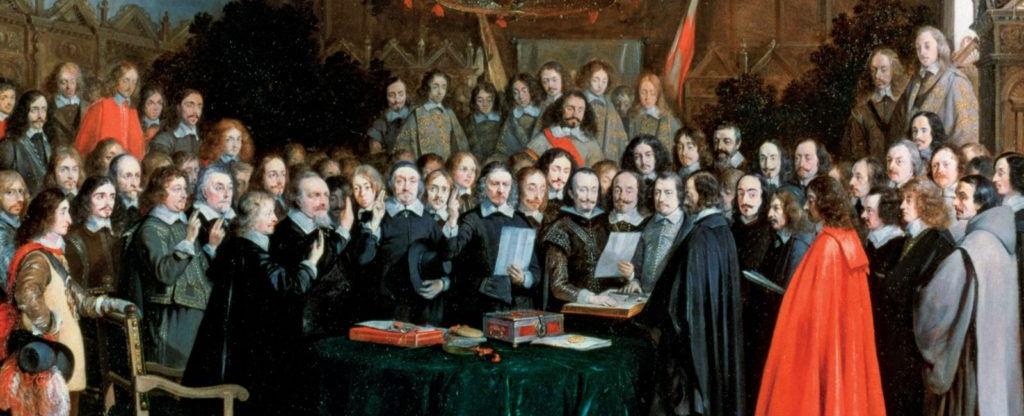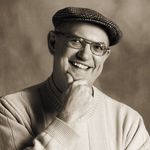Theologians for a Post-Westphalian Church

This was a public lecture given on the occasion of a Conference in celebration of the Twentieth Anniversary of the Theology Ph.D. Program at the University of Dayton, held on 28 September 2019.
This talk offers a long line of sight, a way to look at the significance of our discussions this week end. It begins in 1648 with the Peace of Westphalia. Ending what modern historians call the "religious wars," it divided Europe into multiple "confessional states. "Each nation had a state church. Confessionalism preserved Christendom's ideal union of throne and altar but fractured it into multiple conflicting Christendoms. The Confessional era ended when the spark of the French Revolution spread throughout Europe and Latin America in the 19th century. The legal secularization of states that had once been confessional traumatized all the confessional churches, none more than the Catholic Church. In an ambivalent and belated sense, the ecclesial vision of the free churches became legally normative.
I invite you to join me in a refocusing exercise, to look through a post-Westphalian lens at the theology you have learned to see as natural. I hope you can historicize that theology. If the Council of Trent, at least by its final sessions, represents the Catholic Church's accommodation to the confessional era, Vatican I and Vatican II, often shortsightedly seen as opposites, represent a historical church's attempt to re-imagine itself after confessionalism as a social fact in a voluntary political culture.
Through a post-Westphalian lens, contemporary systematic theology's central preoccupations appear in a new light. Developments in science, history, philosophy, and, especially politics, seemed to push out the supernatural. Ecclesiology, the problematic of nature and grace with attendant anthropological questions, and especially Christology, now look like attempts to seek space for an exiled supernatural in a voluntary, but closed, political order.
Here's what I mean by Westphalian. Bellarmine's legalistic ecclesiology ought not shock us. He is quite literally talking about law, enforceable, in principle, in confessional states by coercion. Just ask the Anabaptists. Confessions such as the Thirty-Nine Articles proliferated and became conditions of citizenship, laws enforced by inquisitors like Spain's Melchior Cano, founder of modern dogmatics, or the English and Prussian censors (we don't call them inquisitors) who troubled Hume and Reimarus. Confessional theology brought new clarity and specificity to the churches. An Erasmian spirit of "In essentials unity, in doubtful matters liberty, in all things charity," (17th century) could not prevail. With growing confessional precision, doubtful matters shrunk. The confessional era flattened out diversity in Christian theology.
Recall that the Catholic Church, the location from which I speak, is only about two and a half centuries into the post-Westphalian age. From this long perspective, Vatican I, 150 years old this year, and Vatican II, are key moments that need to be seen together. Vatican I made a stormy beginning by declaring independence for church and pope from former confessional states, now emerging secular nations. Not surprisingly, it did this in legal terms. No one at Vatican I, certainly not Pius IX, had a clear vision of what might come next. Vatican City and liberal democracy were not on his radar. Until well into the twentieth-century, the cornerstone of papal policy was the restoration of the Papal States.
Though it retained much from the confessional era, Vatican II, as John O'Malley has emphasized, spoke in a new way. Its distinctive exhortatory style meant to inspire and persuade with biblical and patristic images. No canons, no laws! The significance of this in a voluntary political culture cannot be overstated. Vatican II imagined the church as a people, compared it to a sacrament. It was a mystical body, even a continuation of the Incarnation in history. These are not legal categories.
Most important for re-imagining the church in a voluntary political culture was the hotly contested Declaration on Religious Liberty. It affirms not only the church's legal independence, but the freedom of every human being to seek the truth without coercion. Some Catholics are still adjusting to this radically post-Westphalian, post-Constantinian moment. After the council, de Lubac never tired of reminding people that it took nearly a century for Trent's decrees to be legally published in France. We are only fifty years in.
At stake in this ongoing transition is nothing less than how to imagine and live the church in our voluntary political culture. Theologians are supposed to think and speak about such things. But the magnitude of our task requires us to change the way we talk. In O'Malley's terms, we need to shift from academic Culture Two to Humanistic Culture Three, poetry, rhetoric, and the common good. This is what voluntary religious subjects need to hear. Systematic theology, with its discursive, third-person style, cannot continue its hegemony. As a genre, dogmatic theology is left over from a Westphalian era, in which law, and national and religious identity, required nothing less than its third-person clarity. Systematic theology is what confessional era dogmatic theology became in new 19th-century German state universities, as sapiential theology, once concerned with saving knowledge of God, morphed into impersonal university Wissenschaft. Along with Westphalian cartography, colonizers imposed confessional dogmatic theology and its thought forms on subject peoples in the Americas and Africa. Local theologians are in the process of making new things from these forms.
Post-Westphalian theologians must take Lonergan seriously when he calls theological specialties "functional." This means we can safely leave our disciplinary specializations, learn from, and be corrected by other specialists. For this we might find inspiration in soon to be St. John Henry Newman. He came of age as legal confessionalism in England was ending. This ignited the Oxford Movement. Newman and his Oxford companions deplored what John Keble called the "National Apostasy," a mutual abdication by both state and church of responsibility for the church. But he gradually lived into voluntarism, and, though he was no stranger to philosophy, developed an "evangelical" style suited to a new political culture, a culture in which dissenters and Catholics now had the franchise, and it was necessary to persuade. Always denying that he was a theologian, he wrote histories, autobiographies, and other genres designed to touch hearts as well as intellects.
Well told history and biography, especially stories of suffering and resistance, can be powerfully persuasive. Autobiography, as in narratives of overcoming slavery, or even in the modernist crisis, is often an outsider genre. Free Church theologians have been dealing with outsider status and voluntary culture for a long time. Perhaps it is no accident that proposals for narrative theology first came from them.
With the daunting task of re-imagining the church before us, theologians find ourselves working in a highly polarized church. Is the church a field hospital from which missionary disciples go forth to accompany a suffering world, offering the church's gifts, and then be themselves gifted a hundredfold? Or is the church, and especially its moral teaching on the reproductive family, a last stay against a fragmented world perilously poised over a bottomless abyss of arbitrary cultural norms? Or might the church become some surprising mix of both these images?
Two historical analogies prove cautionary. After Catholic Emancipation in England in the 1830s, and the reestablishment of the hierarchy in 1850, many distinguished converts came to the church. Descendants of Recusant Catholics whose forebears had saved Catholicism in England found themselves on the outside of new and different Catholic sensibilities, embodied in the likes of Fr. Faber's devotionalism and Cardinal Manning's ultramontanism.
The Romantic Catholic revival that swept France in the early nineteenth century gave rise to the Ultramontane movement which eventually papalized the church. Enthusiastic ultramontane converts like Henri-Dominique Lacordaire and Louis Veuillot brought new energy and vision to the church, but they clashed with descendants of older Catholics who had survived the Revolution and hoped to preserve something of the church's historic connection to France. At Vatican I, the French minority bishops shared those hopes. Pius IX denounced them for looking back to a gone forever French past.
In these two examples, embodied and deeply held ways of being Catholic faced off. Questions flew from both sides about who were the real Catholics.In the long view, neither of these polarized pairs produced a clear "winner." In historical change's hybridizing manner, new and unexpected results came about in both cases. Though they serve us as cautionary tales, neither historical example shows us a way forward to a post-Westphalian church.
That's where you come in. I can look in my rear view mirror and see my church and my world receding in the distance. But I also see you. One of my greatest joys has been following each of you from application to graduation to your work in church and world. The immensity of the challenges we face reminds me of another period of tremendous religious and social energy and creativity, the 1930s. Along with rampant capitalists, staggering economic depression, and distorted nationalisms around the world, it also gave us Dorothy Day and many other heroic figures.
From climate and migration, extreme economic disparity, and the neo-liberals who profit from them, to sexual abuse in the church with no seeming end, our challenges can appear paralyzing. But they are giving rise to new movements that will need organic intellectuals. UD's new Ferree Chair captures our moment in a recent talk called "Blessed Beginnings." Kelly Johnson has just the words post-Westphalian theologians need to hear:
So I'm here to tell myself and to tell you: this is a good time to be alive. This is a good time for us to be right here, to be together, to be uncertain, to be fragile, not to be in control of our world, and to act boldly in love anyway. We are in trouble, and loving God will get us into more trouble. That's what it is to be a human creature in this broken world that is so loved by God. That's a good gift.
Share
William L. Portier
Mary Ann Spearin Chair of Catholic Theology and Ph.D. Program Director, University of Dayton
William L. Portier holds the Mary Ann Spearin Chair of Catholic Theology and is the Ph.D. Program Director in the Department of Religious Studies at the University of Dayton.
Topics
Newsletter
QUICK LINKS

